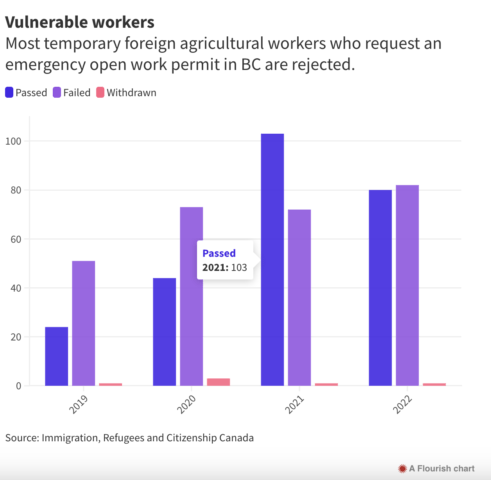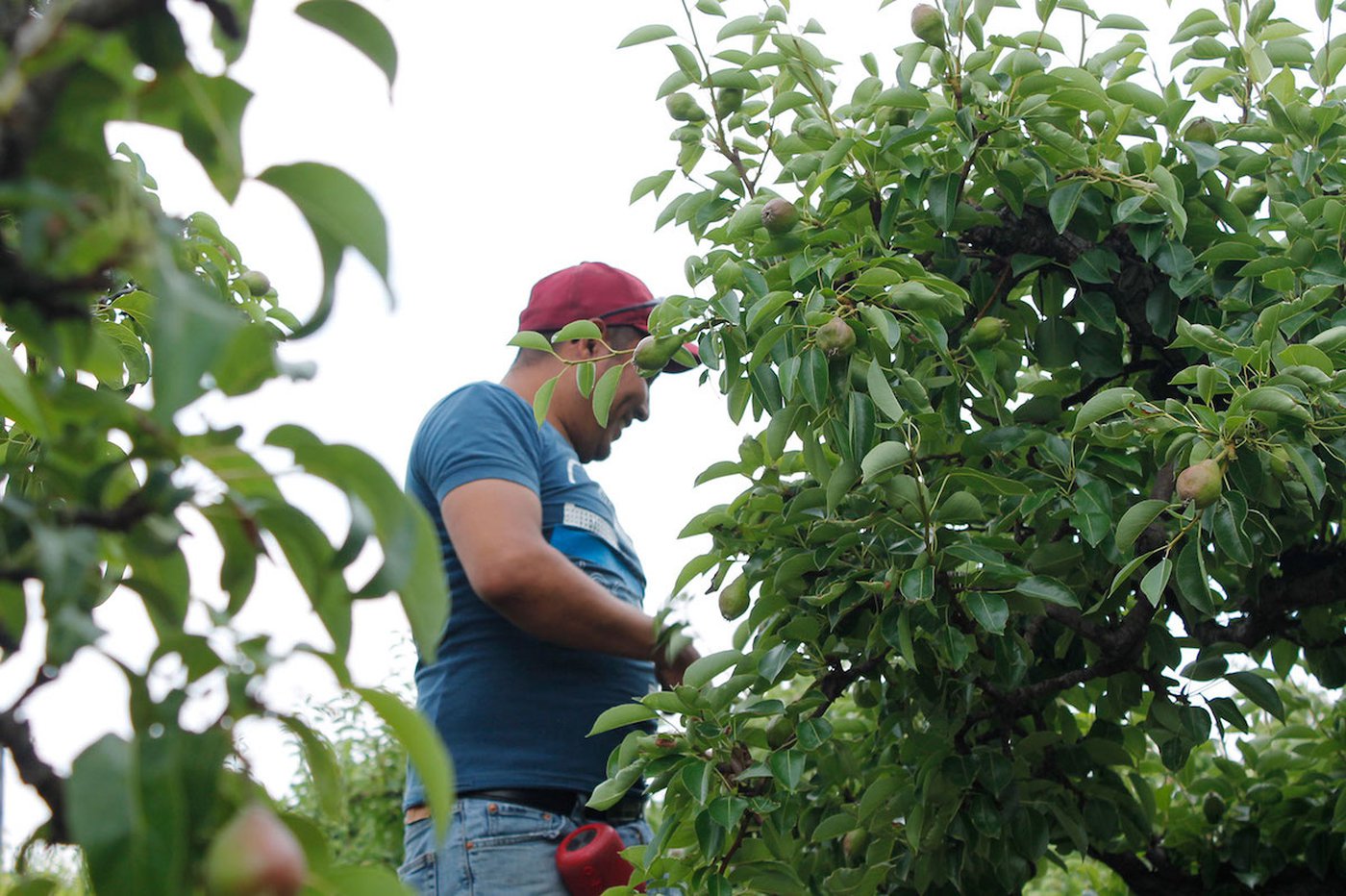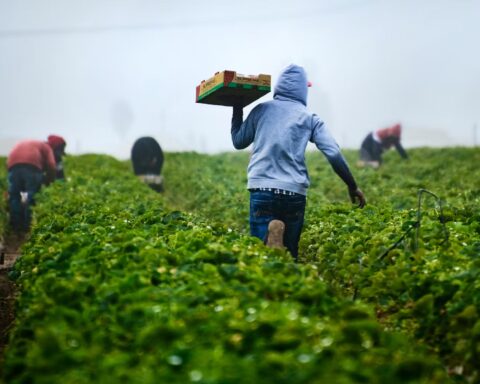Last year, nearly 12,000 workers travelled from Mexico, Guatemala and across the world to work on B.C. farms.
Every one of them had a chunk of their paycheque deducted to cover employment insurance premiums.
But unlike workers based in Canada, migrant farmworkers can almost never claim that money once their contracts are up and they are no longer working.
And now, migrant farmworkers are trying to sue the federal government, claiming they’re owed hundreds of millions in damages.
A proposed class-action lawsuit filed in Ontario last month says those programs, which brought more than 70,000 workers to Canada on temporary visas in 2021, violate Charter rights by forcing the workers to work for a single employer and pay into government benefits that almost none of them can actually claim.
Jody Brown, a partner at one of three Ontario firms that brought the class action on behalf of a pair of migrant workers, says they seek up to $500 million in general and punitive damages for the tens of thousands of migrant workers who have come to Canada in the last 15 years.
Brown says they are also seeking policy changes, including an end to “closed” work permits, that would transform a program that has become critical to Canada’s agricultural sector.
“We do not want that to end. We want them still to be able to come to Canada to work,” said Brown, who works in the Toronto office of Goldblatt Partners LLP. “But when it’s tied work, it’s a form of indentured slavery.”
The lawsuit has not been certified by the Ontario Superior Court of Justice. Even if it is, Brown says, it would likely take years to reach a conclusion.
But advocates and observers say it’s a serious legal challenge to a work system that they say discriminates against vulnerable foreign workers.
In 1966, workers from Jamaica began coming to Canada under the Seasonal Agricultural Worker Program on temporary visas to work on farms. The program has expanded over the years as Canada forged agreements with other countries, including Mexico, and introduced another, separate stream for agricultural workers under the Temporary Foreign Worker Program.
Almost all the workers are on closed work permits that only allow them to work for a single employer. They typically also live on the farms where they work.
A 2023 Tyee investigation into those programs in B.C. this year found evidence of inadequate housing, wage theft and worker abuse that advocates say go largely unpunished.

Mitch Ward, a worker advocate at Shuswap Immigrant Services Society in Salmon Arm, says the restrictive nature of work permits makes migrant workers targets for exploitation by their employers.
“I think these closed permits are incredibly dangerous,” Ward said. “It’s structured vulnerability for the benefit of the employer.” The permits mean that if workers complain about abuse, they not only lose their jobs but have to return home. While workers have been able to apply for a temporary open work permit since 2019, they can do so only if they can prove they’ve already been a victim of abuse.
That requires submitting a successful application in either English or French, even though the vast majority of farmworkers are from countries where neither is an official language. Data obtained by The Tyee indicates roughly half of those applications were rejected in 2022.
Paying for EI coverage that doesn’t exist
One of the lawsuit’s central claims is that Canada has unfairly required migrant farmworkers to pay into the country’s employment insurance program, even though they can almost never claim benefits.
Workers who come to Canada are given a temporary social insurance number and, like all permanent residents or citizens, pay an EI premium each week based on their pay. Their employers also make contributions.
But workers can claim EI only if they reside in the country. And since migrant workers who lose their jobs have to leave Canada, they cannot claim the benefit.
“In order to collect EI, you have to be ready and able to work in Canada. That simply does not apply to people when the structure of their work is that they have to leave the country when they stop working,” Brown said.
Ward, who has spent years supporting migrant farmworkers in B.C.’s Interior, said he’s helped many file claims for EI.
Many of those workers, Ward said, come on “serial” contracts to pick various fruits as they come into season across British Columbia, especially in the Okanagan. If a season is cut short by fire, flood or bad weather, they may be able to get a new contract harvesting another crop. But in many cases, their season is cut short, and they have no choice but to return home. Even in those instances, workers can’t claim EI, often leaving them with far less income than they expected to make.
This year, wildfires and searing heat across B.C. upset the harvest for many fruit growers and forced hundreds of migrant workers to flee farms.
Some workers were able to access a one-time $1,000 emergency payout, but they could not claim employment insurance to make up for lost cash.
Ward said that in his experience the only workers who can claim EI are those who are on temporary open visas after being victims of abuse.
The lawsuit filed in Ontario estimates that since 2008, migrant workers may have paid as much as $197 million into the EI system. Their employers, in the same time period, may have contributed as much as $275 million.
Chris Ramsaroop, an organizer with Justicia for Migrant Workers in Ontario, said workers have long complained they are forced to pay into EI even though they can rarely ever take advantage of it.
“Workers may not have used the word ‘wage theft,’ but they very much saw this as the theft of their wages,” Ramsaroop said.
Growing pressure for changes
Canada, employers and provincial governments have defended migrant farmworker programs, arguing cases of abuse and exploitation are rare exceptions and not a systemic problem.
But recently, officials have opened the door to change. Marc Miller, the federal minister in charge of the file, said in a committee in November he was planning reforms to Canada’s temporary foreign worker programs aimed at preventing abuse.
Miller said closed work permits would continue but hinted he was open to “a more open or regional form of permit.” A Senate committee examining the issue has floated a similar idea, arguing it could be economically beneficial and could give migrant workers more flexibility.
Brown says such a system would force farm owners to compete for employees, which would require them to improve wages and working conditions.
“So long as they create decent working conditions, they have nothing to be concerned about. You’re still going to have people who want to come to Canada to work, but they’re just going to have more rights in terms of their labour,” Brown said.
Not everyone agrees with the ideas. In earlier interviews with The Tyee, farm associations argued regionalized or industry-specific work permits would be difficult to implement, especially since farm owners often spend their own money to bring migrant workers to Canada.
And some advocates, like Ramsaroop, argue a sectoral permit doesn’t go far enough. “We’re basically tying workers to a precarious industry instead of a precarious employer,” he said.
Ward said his preference would be that migrant farmworkers can gain permanent residency status. But he says any move away from closed permits is a step in the right direction.
“Anything we can do to end these closed permits is going to do some good for sure,” Ward said.
The statement of claim argues the tied permit system stems directly from racist government policies in the 1960s, which sought to deny Black and other racialized workers the same benefits afforded to Canadian employees.
Brown said that even if times have changed, that system hasn’t.
“The same policy that was created then, which was created based on these sentiments, is the same program today. It has not structurally changed at all,” he said.
______________________________
– Zak Vescera, Local Journalism Initiative Reporter, The Tyee
The Local Journalism Initiative supports the creation of original civic journalism that is relevant to the diverse needs of underserved communities across Canada, broadening availability and consumption of local and regional news on matters of civic governance. Launched by the Government of Canada in 2019, the Local Journalism Initiative provides news organizations with funding to hire reporters to cover underserved communities.




